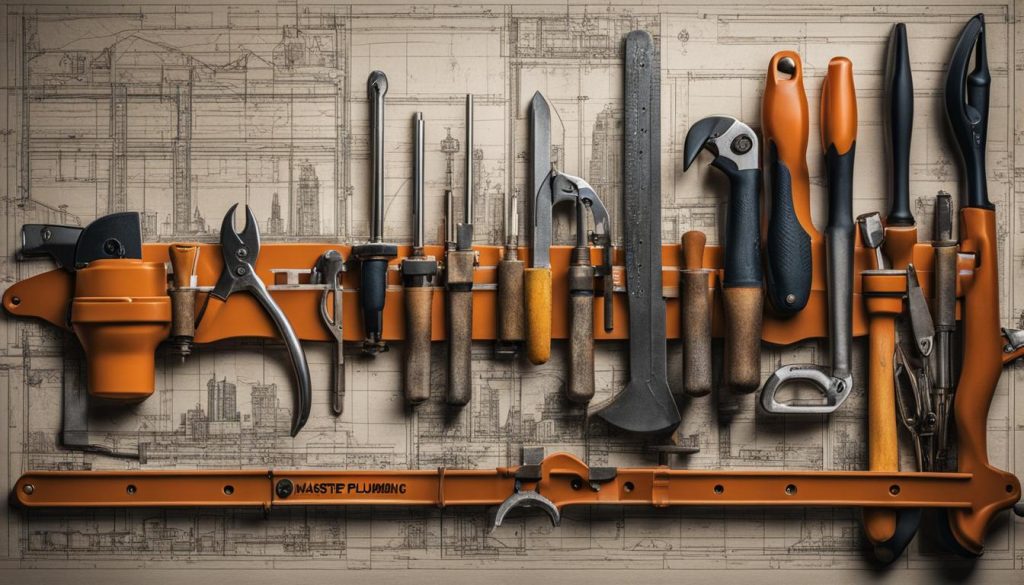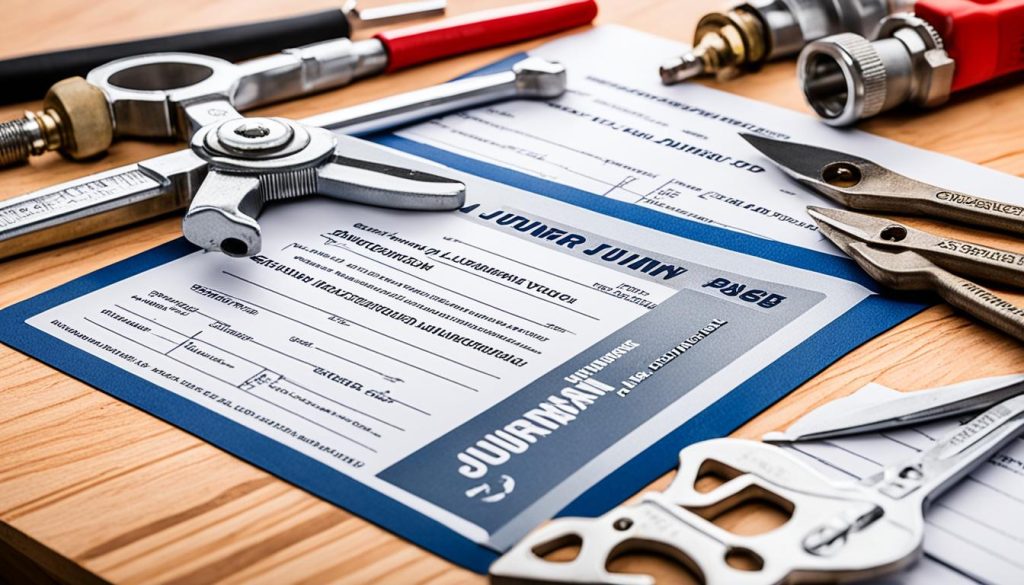Path to Your Journeyman Plumbing License
Did you know that the plumbing industry in Canada is experiencing significant growth, with an expected increase of 9.1% between 2020 and 2025? This surge in demand for skilled plumbers makes it an opportune time to pursue a journeyman plumbing license.
Obtaining your journeyman plumbing license is a crucial step towards building a successful career in the plumbing industry. It not only demonstrates your competence and expertise but also opens up numerous job opportunities.
Key Takeaways:
- To meet the requirements for a journeyman plumbing license, you need to complete an apprenticeship, fulfill experience requirements, and pass the necessary exams.
- The plumbing industry is experiencing rapid growth, creating a high demand for skilled plumbers.
- Each province in Canada has its own licensing board and specific criteria for obtaining a plumbing license.
- Continuing education and joining industry associations can help you stay updated and enhance your skills in the plumbing industry.
- A career as a journeyman plumber offers a competitive salary and long-term career growth opportunities.
Understanding the Plumbing Industry
The plumbing industry plays a crucial role in maintaining the smooth functioning of our plumbing systems, ensuring our daily activities are not disrupted. From fixing leaky faucets to installing complex piping systems, plumbers are essential to our modern society.
The demand for skilled plumbers is steadily increasing, driven by factors such as population growth and urbanization. As more residential and commercial buildings are constructed, the need for plumbing services continues to grow. In the United States alone, there are approximately 480,600 licensed plumbers, and this number is projected to rise in the coming years.
According to the US Bureau of Labor Statistics, the plumbing industry has experienced consistent growth, with an average annual growth rate of 3.0%. This growth trend is expected to continue, with an average of 51,000 job opportunities for plumbers annually until 2030.
These statistics highlight the strong demand for skilled plumbers and the abundance of job opportunities in the industry. Whether you are just starting your career or considering a transition into the plumbing industry, this demand opens up exciting prospects for growth and success.
To visually illustrate the growth rate of the plumbing industry, refer to the following table:
| Year | Number of Plumbers |
|---|---|
| 2010 | 400,000 |
| 2015 | 435,000 |
| 2020 | 478,000 |
| 2025 | 515,000 |
| 2030 | 552,000 |
As the table demonstrates, the number of plumbers has steadily increased over the years, reflecting the growing demand and the job opportunities available in the plumbing industry.
Becoming a Plumbing Apprentice
The first step on the path to becoming a journeyman plumber is to complete a plumbing apprenticeship. Most plumbers start their careers as apprentices, where they gain hands-on experience and learn the necessary skills.
To become an apprentice plumber, you must be over 18 and have a high school diploma or GED. Some states may require you to apply for an apprentice plumber license. As an apprentice, you will work under the supervision of a journeyman or master plumber, learning the trade and honing your skills through on-the-job training.
Obtaining Your Journeyman Plumbing License
To obtain your journeyman plumbing license in Canada, you need to meet specific experience requirements. These requirements may vary depending on your province or territory, so it’s essential to research the regulations in your area. In general, you will be required to have a certain amount of work experience in the plumbing field before you can apply for your journeyman license.
In most provinces, you will need a minimum of four years of practical experience working as a plumber. This means you must have gained hands-on knowledge and skills through real-world plumbing projects. However, some provinces may accept a lesser amount of experience, provided you have completed the required classroom hours to supplement your practical knowledge.
During your apprenticeship as a plumber, you will have the opportunity to work alongside experienced plumbers, learning the trade and building your expertise. This on-the-job training is crucial in developing the skills necessary to become a competent and successful journeyman plumber.
Applying for the Journeyman Exam
Once you have fulfilled the experience requirements, you will be eligible to take the journeyman exam. This exam is designed to assess your knowledge of provincial regulations, plumbing codes, and the installation, maintenance, and repair of plumbing systems.
The journeyman exam is an important milestone in your journey towards becoming a licensed plumber. It tests your understanding of plumbing principles and ensures that you have the necessary expertise to work independently as a journeyman plumber.
Preparing for the journeyman exam requires diligent study and review of the relevant materials. It is recommended to consult study guides and practice exams to familiarize yourself with the format and content of the test. By dedicating sufficient time and effort to your exam preparations, you can increase your chances of success.
Passing the journeyman exam demonstrates your proficiency in the plumbing trade and qualifies you to work as a licensed journeyman plumber. It opens up new opportunities for employment and advancement in the plumbing industry.
Image:
Advancing to a Master Plumbing License
Once you have gained two or more years of experience as a journeyman plumber, it may be time to consider advancing to a master plumbing license. Achieving a master plumbing license is a significant milestone in your plumbing career and essential if you aspire to operate your own plumbing business.
Obtaining a master plumbing license involves additional requirements, including passing an exam that covers various topics beyond the scope of a journeyman level. These topics can include law, finance, and business, as they are crucial aspects of running a plumbing business successfully. By acquiring knowledge in these areas, you will be better equipped to handle the management and administrative responsibilities that come with operating your own company.
Each location may have specific requirements and exams for those aspiring to work as a contractor. It is essential to research and understand the regulations in your area to ensure successful completion of the master plumbing license process.
Benefits of a Master Plumbing License
Obtaining a master plumbing license opens up new possibilities for your plumbing career. With this license, you gain the ability to take on more significant responsibilities and expand your professional opportunities. Some of the advantages of holding a master plumbing license include:
- Operating your own plumbing business or becoming a contractor
- Being eligible for specialized projects and contracts
- Earning higher wages and potential for increased income
- Supervising and training apprentice plumbers
- Enhancing your professional reputation and credibility
With a master plumbing license, you are recognized as an expert in your field and can take on more complex and challenging projects, contributing to your overall career growth.
| Master Plumbing License Requirements | Additional Exams |
|---|---|
| Minimum of two years of experience as a journeyman plumber | Comprehensive exam covering law, finance, and business topics |
| Meet specific location requirements for working as a contractor | Additional exams may be required depending on the location |
 |
|
Understanding State Regulations and Unique Rules
When it comes to obtaining a plumbing license, it’s essential to understand that each state in Canada has its own specific requirements and regulations. While the overall process is typically straightforward, there may be additional criteria depending on the state in which you plan to work.
For instance, some states may require applicants to submit a full set of fingerprints and undergo a criminal background check as part of the licensing process. These measures are in place to ensure the safety and integrity of the plumbing industry.
In addition to these general requirements, certain states have unique rules and regulations that applicants must adhere to in order to obtain a plumbing license. These rules may cover various aspects such as educational prerequisites, practical experience, or specific examinations.
Before initiating the application process, it is crucial to thoroughly research and familiarize yourself with the specific requirements outlined by the licensing board of your intended work state. This will help ensure a smooth and successful licensing journey.
State Plumbing License Requirements
Here is a brief overview of some common requirements that states may have for obtaining a plumbing license:
- Satisfactory completion of a plumbing apprenticeship program or relevant plumbing education.
- Completion of a certain number of practical work hours in the plumbing field.
- Successful passing of state-specific licensing exams.
- Demonstration of knowledge and understanding of plumbing codes and regulations.
- Proof of liability insurance or bonding requirements.
It’s important to note that these requirements may vary from state to state. Therefore, it’s crucial to consult the specific licensing board or regulatory body of the state where you plan to work for accurate and up-to-date information.
Unique Rules for Plumbing Licenses
Alongside the general requirements, certain states may have unique rules and regulations that must be followed when applying for a plumbing license. These rules are put in place to address specific concerns and considerations related to the plumbing industry in that particular jurisdiction.
For example, a state may have a mandate for continuing education or ongoing professional development to maintain a plumbing license. This ensures that licensed plumbers stay updated with the latest advancements, technologies, and codes in the field.
Other states may have additional requirements, such as declaring financial responsibility or passing specific trade exams, to ensure that licensed plumbers have the necessary skills and business acumen to operate successfully.
| State | Unique Rules and Regulations |
|---|---|
| State A | Plumbers must complete annual continuing education courses to maintain their license. |
| State B | Plumbers must pass a separate business and law exam in addition to the plumbing trade exam. |
| State C | Plumbers must demonstrate financial responsibility by posting a bond or obtaining liability insurance. |
These unique rules and regulations highlight the importance of understanding the specific licensing requirements of the state where you plan to work. By meeting and complying with these rules, you can ensure that you are well-prepared to navigate the plumbing industry within that jurisdiction.
Applying for a Plumbing License in Canada
Obtaining a plumbing license in Canada is an important step towards a successful career in the plumbing industry. However, it’s essential to understand that licensing requirements vary between provinces due to regional licensing systems. Each province in Canada has its own licensing board and unique rules and regulations for becoming a licensed plumber.
To apply for a plumbing license in Canada, you will need to meet the specific criteria set by your province’s licensing board. This typically involves a combination of training, certification, practical experience, and passing the necessary exams. It’s crucial to research and understand the training and certification requirements in your province before proceeding with the application process.
When applying for a plumbing license, it’s important to gather all the required documentation, such as proof of completed training programs, certification, and work experience. Additionally, you may need to provide reference letters and pass background checks as part of the licensing process.
Here are some key points to consider when applying for a plumbing license in Canada:
- Research the specific licensing requirements in your province and consult the licensing board for detailed information.
- Complete the necessary training programs and certification courses required by your province.
- Accumulate the required amount of practical experience through apprenticeships or on-the-job training.
- Prepare all the required documentation, including proof of completed training, certifications, reference letters, and any other documents specified by your province’s licensing board.
- Submit your application to the licensing board and follow their instructions regarding the application process.
- Stay informed about any updates or changes in licensing regulations in your province.
By carefully following the licensing requirements specific to your province, you can increase your chances of obtaining a plumbing license and pursuing a successful career as a licensed plumber in Canada.
Considerations and Resources for Success
As a journeyman plumber, there are several important factors to consider for a successful and fulfilling career in the plumbing industry. One of the key considerations is the competitive salary that plumbers can earn. With the potential to make over $98,900 per year, being a plumber can provide financial stability and rewards.
The median annual wage for plumbers in Canada is $56,330, which offers a stable income for individuals pursuing a career in the plumbing industry. It’s important to note that the earning potential can vary based on your location. States like Alaska, Illinois, and Massachusetts tend to offer higher average salaries for plumbers, presenting opportunities for increased income.
In addition to salary considerations, there are valuable resources available to plumbing professionals to support their career growth. Industry associations provide a platform for networking, knowledge sharing, and professional development. These associations organize events, workshops, and conferences that allow plumbers to stay updated with the latest industry trends and technologies, fostering continuous improvement.
Continuing education programs also play a crucial role in enhancing skills and knowledge in the plumbing field. These programs offer specialized training, certification courses, and workshops that allow plumbers to expand their expertise and stay ahead in a rapidly evolving industry. By actively participating in these resources and staying informed, plumbers can achieve long-term success and career growth.
- Investing Wisely: How Windows & Doors in Boost Property Value and Financial Health - April 24, 2025
- The Financial Impact of Personal Injuries: Why Legal Help Matters for Business Owners - April 16, 2025
- The Hidden Financial Costs of Domestic Assault: What Business Owners Need to Know - April 16, 2025












